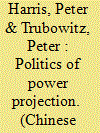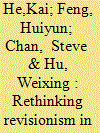|
|
|
Sort Order |
|
|
|
Items / Page
|
|
|
|
|
|
|
| Srl | Item |
| 1 |
ID:
177317


|
|
|
|
|
| Summary/Abstract |
During the last few years, and especially since the outbreak of the COVID-19 pandemic, growing number of Middle East scholars and analysts have been closely observing an escalation of tensions between China and the United States and their impact beyond bilateral ties. Considering the major differences of focus and approach among these observers, this article aims to review systematically such Middle Eastern perspectives, both globally and regionally, on the emerging Sino-US rivalry. Certain Middle East analysts regard Beijing and Washington as largely “homogeneous” extra-regional powers competing in international politics, economy, and technology. Many others emphasise their “heterogeneity,” arguing that the essence of Sino-US confrontation lies in the clash of two models. Most Middle East scholars note that, in contrast to Washington’s waning influence, Beijing’s growing presence in the region during the past decade has rendered the Middle East a “new battleground” for the two great powers. Although China and the United States still have shared interests in certain regional affairs, most intellectuals focus on and collectively identify five domains across the Middle East wherein Beijing and Washington are locked in asymmetric competition. In light of both the opportunities and challenges that the emerging Sino-US rivalry engenders, Middle Eastern observers raise various policy suggestions, and debate on whether regional players should proactively take advantage of this great power competition, cautiously hedge against strategic uncertainty and risk, or constructively help reduce hostility between the United States and the People’s Republic of China.
|
|
|
|
|
|
|
|
|
|
|
|
|
|
|
|
| 2 |
ID:
177316


|
|
|
|
|
| Summary/Abstract |
This article explains why the Belt and Road Initiative (BRI) and the Asian Infrastructure Investment Bank (AIIB) are likely to have differential effects on the rules governing development finance. I draw on principal-agent models in arguing that in these two institutions, the delegation problem facing the Chinese government is different and therefore associated with different types of institutional change. The fragmented-authoritarian nature of the Chinese state profoundly affects delegation in the BRI. In the AIIB, in contrast, the delegation is to an international organization and hence not materially affected by the fragmented authoritarian nature of the Chinese state. Drawing on historical-institutionalist approaches to gradual institutional change, the article argues that the AIIB is likely to lead to institutional layering, the BRI to institutional displacement in development financing.
|
|
|
|
|
|
|
|
|
|
|
|
|
|
|
|
| 3 |
ID:
177313


|
|
|
|
|
| Summary/Abstract |
Why did the Obama administration's attempted pivot (or “rebalance”) to Asia fail? In this article, we argue that three interrelated domestic factors are to blame: hyper-partisanship in Washington, DC; the lack of a compelling foreign-policy narrative to make the pivot intelligible and attractive to a broad slice of the political class and domestic public; and the related failure to convince enough Americans that the pivot was necessary to boost their economic fortunes. These domestic stumbling blocks made it impossible for the Obama administration to invest US power assets toward a long-term programmatic endeavor in the Asia-Pacific. In making this argument about the domestic foundations of US power-projection, we improve upon existing explanations of the pivot's undoing that focus on international-level obstacles, problems with the pivot's design and implementation, or the unexpected election of Donald Trump as Obama's successor. We conclude by drawing implications for US power projection beyond the pivot and, indeed, beyond East Asia—suggesting that the US political system has become a weak foundation upon which to build any ambitious foreign-policy superstructure.
|
|
|
|
|
|
|
|
|
|
|
|
|
|
|
|
| 4 |
ID:
177307


|
|
|
|
|
| Summary/Abstract |
Revisionism is an important concept in international relations discourse, and it is especially prevalent in discussions about relations between China and the United States in the context of a possible power transition. Yet, this concept has until recently not received the systematic research attention that it deserves. We present in this essay different strategies that a revisionist state may pursue. It builds on recent scholarship by other colleagues and is drawn from a larger project of ours to study revisionism historically and develop it conceptually. We argue that military conquest and subversion—or in our terminology, hard revisionism—have become less likely in today’s world compared to the past. Instead, different approaches of soft revisionism intended to advance institutional changes should be given more attention. We provide a typology of these soft revisionist strategies and offer examples from recent Chinese and US conduct to illustrate them.
|
|
|
|
|
|
|
|
|
|
|
|
|
|
|
|
| 5 |
ID:
177315


|
|
|
|
|
| Summary/Abstract |
No other text in the intellectual history of International Relations has become as frequent a victim of confirmation bias and selective presentism as has Thucydides’ History of the Peloponnesian War. Most recently, misinterpretations of the classical treatise have engendered the popular catchphrase, “the Thucydides’ Trap”, and thinkers and politicians’ resultant drawing of erroneous parallels between the Peloponnesian War and current Sino-US relations. This article seeks to deconstruct the Thucydides’ Trap core thematic of inadvertent escalation, and to outline the logic of hegemonic transition as it is actually expounded by Thucydides. Although Thucydides is the first thinker in the West clearly to identify the significance of structure in interstate affairs, his hegemonic transition theory is complex rather than purely systemic. Thucydides thus dedicates most of his work to assessing the strategic decisions made in fervid political debates, evidencing his perception of polity and politics as key elements that dynamically interact with structural conditions to effectuate strategic choice. Consequently, the Peloponnesian War was not an outcome of inadvertent escalation, but of premeditated strategic choices made by adversaries with clashing policy objectives. Therefore, within the structural constraints, it is on leadership and strategy that Thucydides puts a premium, and hence prioritizes prudence (Sophrosyne/Σωφροσύνη) as the most consequential virtue of statesmanship. Building on the Thucydidean logic of hegemonic transition, we conclude by presenting six strategic corollaries of contemporary Sino-US relations, remaining attentively cognizant at all times of the limitations of historical analogies, and abiding by ex antiquis et novissimis optima.
|
|
|
|
|
|
|
|
|
|
|
|
|
|
|
|
|
|
|
|
|